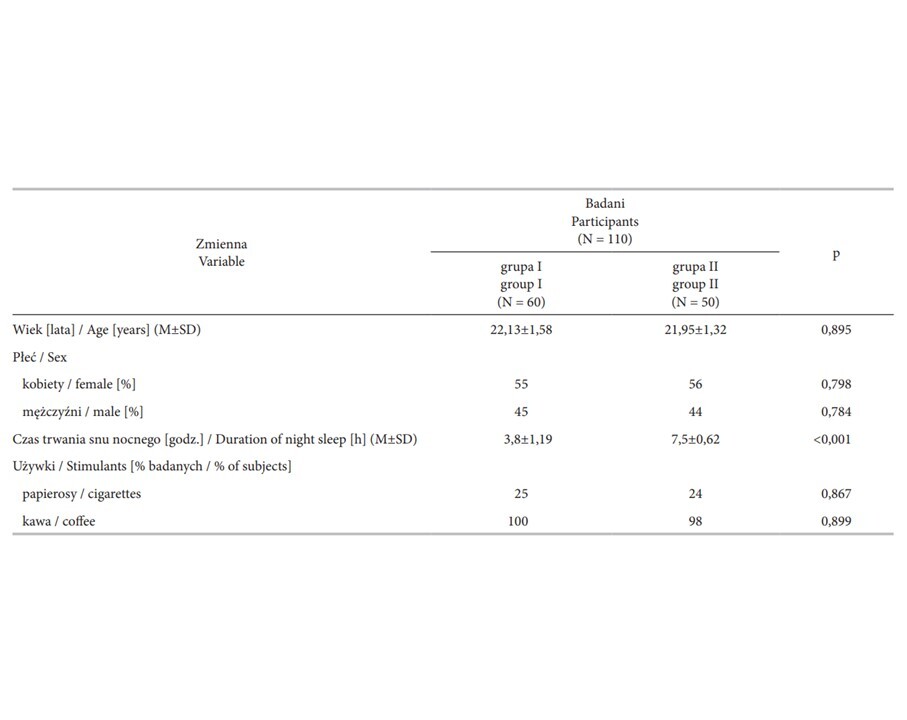Online first
Current issue
Archive
Most cited in 2024
About the Journal
Editorial Office
Editorial Board
Copyright and self-archiving policy
Information clause on the processing of personal data
Declaration of accessibility
Instructions for Authors
Instructions for Reviewers
Contact
Reviewers
2024
2023
2022
2020
2021
2019
2018
2017
2016
2015
2014
2013
Editing and translations
ORIGINAL PAPER
The influence of sleep deprivation on the cognitive processes in medical students during exam session
1
Uniwersytet Medyczny we Wrocławiu / Wroclaw Medical University, Wrocław, Polska (Katedra Fizjologii i Patofizjologii, Zakład Patofizjologii / Department of Physiology and Pathophysiology, Division of Pathophysiology)
2
MOLMED Psychiatria i psychoterapia behawioralna dzieci i młodzieży / MOLMED Psychiatry and Behavioural Psychotherapy for Children and Adolescents, Wrocław, Polska
Online publication date: 2023-01-23
Corresponding author
Anna Janocha
Uniwersytet Medyczny we Wrocławiu, Katedra Fizjologii i Patofizjologii, Zakład Patofizjologii, ul. T. Chałubińskiego 10, 50-368 Wrocław
Uniwersytet Medyczny we Wrocławiu, Katedra Fizjologii i Patofizjologii, Zakład Patofizjologii, ul. T. Chałubińskiego 10, 50-368 Wrocław
Med Pr Work Health Saf. 2023;74(1):27-40
KEYWORDS
cognitive processesvisual evoked potentialsauditory evoked potentialssleep deprivationsensorimotor performancepsychosomatic fatigue
TOPICS
- physiological response to workload and working conditions
- fatigue assessment
- assessment of workload (physical and chemical) impact and of the influence of the working conditions on the employees’ fitness for work and health
- physiological aspects of the organization of work (working time, shift work)
- occupational hygiene (occupational health)
ABSTRACT
Background: Along with socio-economic pression increase in developed countries, the progressive shortening of night sleep has been observed. Sleep plays a vital role in human organism regeneration, and its deprivation leads to a series of adverse psychosomatic effects, including intellectual performance limitation or reducing body immunity, which increases susceptibility to diseases. Chronic sleep deprivation, quite often affecting medical students, significantly contributes to hypersomnia and leads to chronic fatigue. Material and Methods: The results of 60 students were analysed; students were divided into 2 subgroups, depending on the average sleep duration during previous 2–3 nights: IA (2.3±0.8 h on average) and IB (4.9±0.5 h on average). The control group consisted of 50 students, whose night sleep duration in that period was 7.5±0.62 h. In all subjects under analysis visual and auditory evoked potentials were registered, which is a non-invasive method of cognitive performance tests. Results: The obtained results showed that people with average night sleep duration 2.3±0.8 h (subgroup IA) had worse rate and precision of stimulus response, and thereby significantly worse (p < 0.001) sensorimotor performance, then those from subgroup IB. The study of evoked potentials showed significant (from p < 0.04 to p < 0.001) elongation of all latency p-waves connected with the stimulus perception (N75) and attention span (P100, N135). Moreover, significant elongation of visual latency wave P100 and auditory wave V was related to psychophysical fatigue occurring in sleep deprivation. Conclusions: The analysis of this study results, obtained in medical students showed that sleep deprivation occurring during exam session is closely related to cognitive abilities, which in turn adversely affects the academic achievement. These results indicate that night sleep duration is a differentiating factor for cognitive abilities quality. Also, psychosomatic fatigue adversely affects cognitive processes. Med Pr. 2023;74(1):27–40
We process personal data collected when visiting the website. The function of obtaining information about users and their behavior is carried out by voluntarily entered information in forms and saving cookies in end devices. Data, including cookies, are used to provide services, improve the user experience and to analyze the traffic in accordance with the Privacy policy. Data are also collected and processed by Google Analytics tool (more).
You can change cookies settings in your browser. Restricted use of cookies in the browser configuration may affect some functionalities of the website.
You can change cookies settings in your browser. Restricted use of cookies in the browser configuration may affect some functionalities of the website.






